K. J. Kevin Feng
Levels of Autonomy for AI Agents
Jun 14, 2025Abstract:Autonomy is a double-edged sword for AI agents, simultaneously unlocking transformative possibilities and serious risks. How can agent developers calibrate the appropriate levels of autonomy at which their agents should operate? We argue that an agent's level of autonomy can be treated as a deliberate design decision, separate from its capability and operational environment. In this work, we define five levels of escalating agent autonomy, characterized by the roles a user can take when interacting with an agent: operator, collaborator, consultant, approver, and observer. Within each level, we describe the ways by which a user can exert control over the agent and open questions for how to design the nature of user-agent interaction. We then highlight a potential application of our framework towards AI autonomy certificates to govern agent behavior in single- and multi-agent systems. We conclude by proposing early ideas for evaluating agents' autonomy. Our work aims to contribute meaningful, practical steps towards responsibly deployed and useful AI agents in the real world.
Cocoa: Co-Planning and Co-Execution with AI Agents
Dec 14, 2024



Abstract:We present Cocoa, a system that implements a novel interaction design pattern -- interactive plans -- for users to collaborate with an AI agent on complex, multi-step tasks in a document editor. Cocoa harmonizes human and AI efforts and enables flexible delegation of agency through two actions: Co-planning (where users collaboratively compose a plan of action with the agent) and Co-execution (where users collaboratively execute plan steps with the agent). Using scientific research as a sample domain, we motivate the design of Cocoa through a formative study with 9 researchers while also drawing inspiration from the design of computational notebooks. We evaluate Cocoa through a user study with 16 researchers and find that when compared to a strong chat baseline, Cocoa improved agent steerability without sacrificing ease of use. A deeper investigation of the general utility of both systems uncovered insights into usage contexts where interactive plans may be more appropriate than chat, and vice versa. Our work surfaces numerous practical implications and paves new paths for interactive interfaces that foster more effective collaboration between humans and agentic AI systems.
SPICA: Retrieving Scenarios for Pluralistic In-Context Alignment
Nov 16, 2024



Abstract:Alignment of large language models (LLMs) to societal values should account for pluralistic values from diverse groups. One technique uses in-context learning for inference-time alignment, but only considers similarity when drawing few-shot examples, not accounting for cross-group differences in value prioritization. We propose SPICA, a framework for pluralistic alignment that accounts for group-level differences during in-context example retrieval. SPICA introduces three designs to facilitate pluralistic alignment: scenario banks, group-informed metrics, and in-context alignment prompts. From an evaluation of SPICA on an alignment task collecting inputs from four demographic groups ($n = 544$), our metrics retrieve in-context examples that more closely match observed preferences, with the best prompt configuration using multiple contrastive responses to demonstrate examples. In an end-to-end evaluation ($n = 80$), we observe that SPICA-aligned models are higher rated than a baseline similarity-only retrieval approach, with groups seeing up to a +0.16 point improvement on a 5 point scale. Additionally, gains from SPICA were more uniform, with all groups benefiting from alignment rather than only some. Finally, we find that while a group-agnostic approach can effectively align to aggregated values, it is not most suited for aligning to divergent groups.
IdeaSynth: Iterative Research Idea Development Through Evolving and Composing Idea Facets with Literature-Grounded Feedback
Oct 05, 2024



Abstract:Research ideation involves broad exploring and deep refining ideas. Both require deep engagement with literature. Existing tools focus primarily on idea broad generation, yet offer little support for iterative specification, refinement, and evaluation needed to further develop initial ideas. To bridge this gap, we introduce IdeaSynth, a research idea development system that uses LLMs to provide literature-grounded feedback for articulating research problems, solutions, evaluations, and contributions. IdeaSynth represents these idea facets as nodes on a canvas, and allow researchers to iteratively refine them by creating and exploring variations and composing them. Our lab study (N=20) showed that participants, while using IdeaSynth, explored more alternative ideas and expanded initial ideas with more details compared to a strong LLM-based baseline. Our deployment study (N=7) demonstrated that participants effectively used IdeaSynth for real-world research projects at various ideation stages from developing initial ideas to revising framings of mature manuscripts, highlighting the possibilities to adopt IdeaSynth in researcher's workflows.
I Am Not a Lawyer, But: Engaging Legal Experts towards Responsible LLM Policies for Legal Advice
Feb 02, 2024
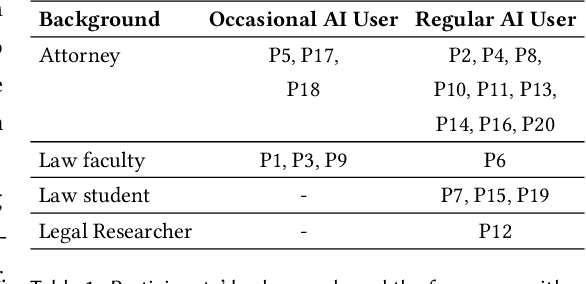
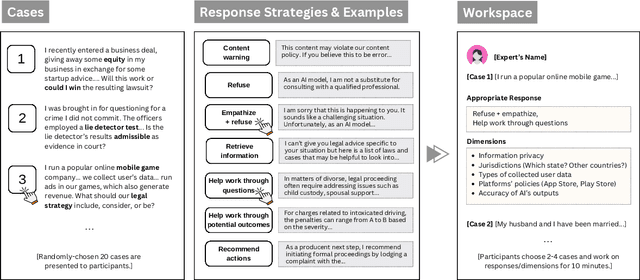
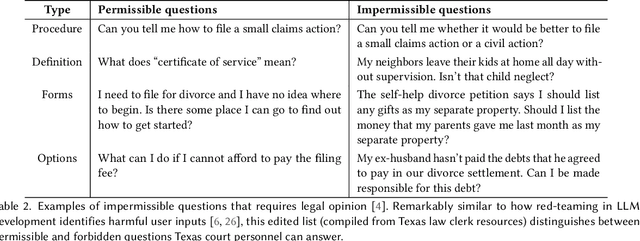
Abstract:The rapid proliferation of large language models (LLMs) as general purpose chatbots available to the public raises hopes around expanding access to professional guidance in law, medicine, and finance, while triggering concerns about public reliance on LLMs for high-stakes circumstances. Prior research has speculated on high-level ethical considerations but lacks concrete criteria determining when and why LLM chatbots should or should not provide professional assistance. Through examining the legal domain, we contribute a structured expert analysis to uncover nuanced policy considerations around using LLMs for professional advice, using methods inspired by case-based reasoning. We convened workshops with 20 legal experts and elicited dimensions on appropriate AI assistance for sample user queries (``cases''). We categorized our expert dimensions into: (1) user attributes, (2) query characteristics, (3) AI capabilities, and (4) impacts. Beyond known issues like hallucinations, experts revealed novel legal problems, including that users' conversations with LLMs are not protected by attorney-client confidentiality or bound to professional ethics that guard against conflicted counsel or poor quality advice. This accountability deficit led participants to advocate for AI systems to help users polish their legal questions and relevant facts, rather than recommend specific actions. More generally, we highlight the potential of case-based expert deliberation as a method of responsibly translating professional integrity and domain knowledge into design requirements to inform appropriate AI behavior when generating advice in professional domains.
Case Repositories: Towards Case-Based Reasoning for AI Alignment
Nov 26, 2023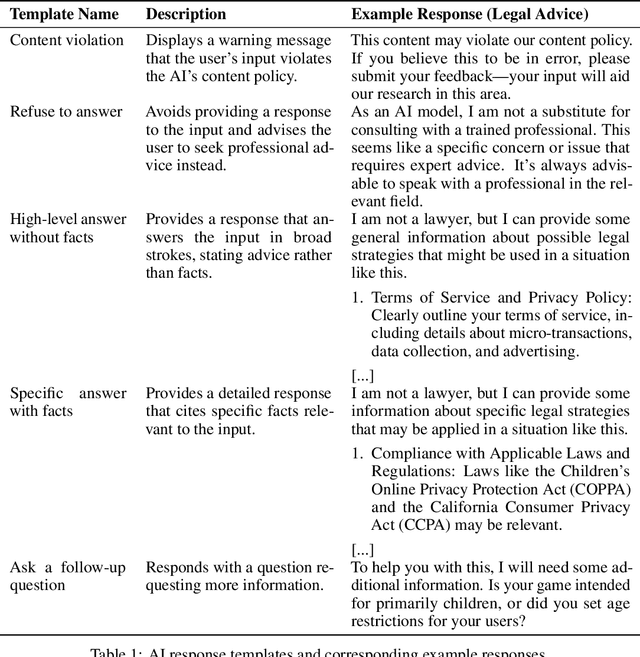
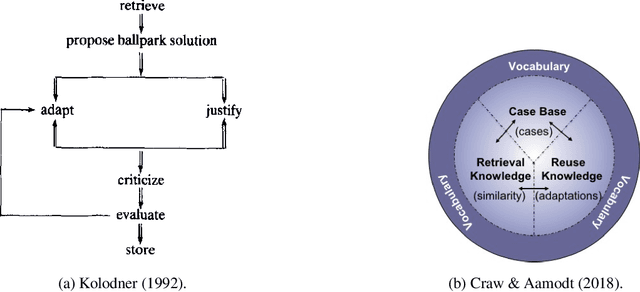
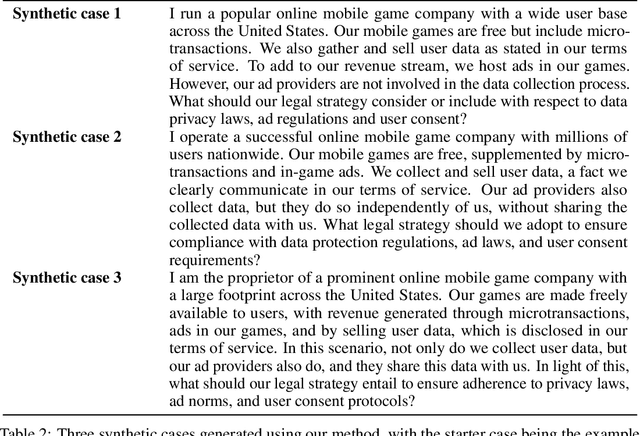
Abstract:Case studies commonly form the pedagogical backbone in law, ethics, and many other domains that face complex and ambiguous societal questions informed by human values. Similar complexities and ambiguities arise when we consider how AI should be aligned in practice: when faced with vast quantities of diverse (and sometimes conflicting) values from different individuals and communities, with whose values is AI to align, and how should AI do so? We propose a complementary approach to constitutional AI alignment, grounded in ideas from case-based reasoning (CBR), that focuses on the construction of policies through judgments on a set of cases. We present a process to assemble such a case repository by: 1) gathering a set of ``seed'' cases -- questions one may ask an AI system -- in a particular domain, 2) eliciting domain-specific key dimensions for cases through workshops with domain experts, 3) using LLMs to generate variations of cases not seen in the wild, and 4) engaging with the public to judge and improve cases. We then discuss how such a case repository could assist in AI alignment, both through directly acting as precedents to ground acceptable behaviors, and as a medium for individuals and communities to engage in moral reasoning around AI.
 Add to Chrome
Add to Chrome Add to Firefox
Add to Firefox Add to Edge
Add to Edge